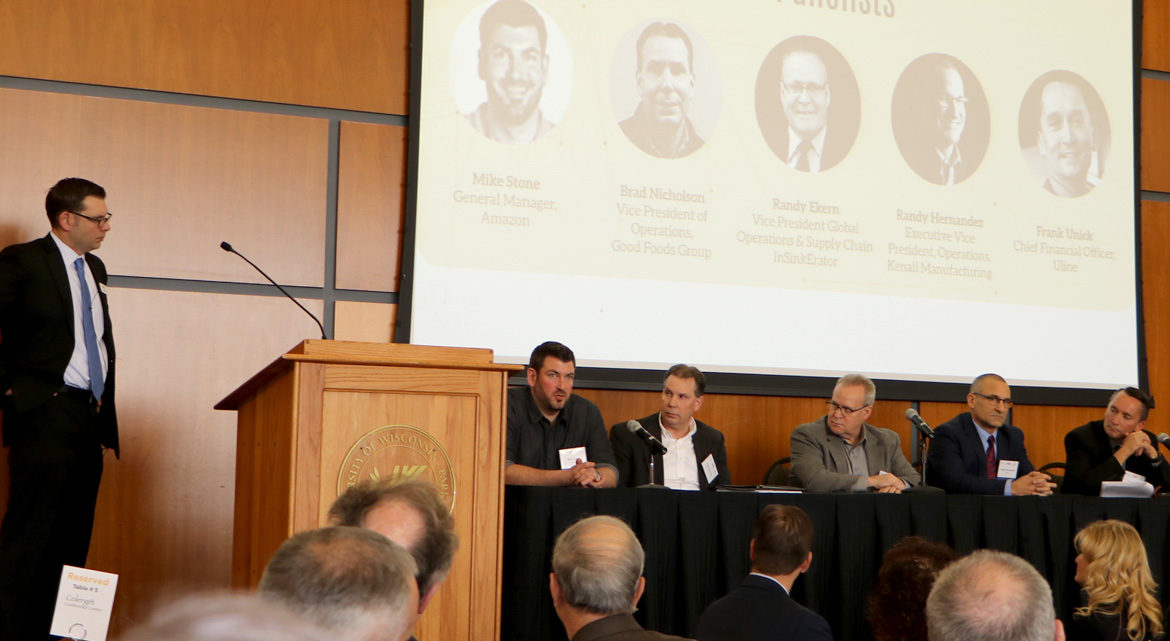In front of a packed audience, the Kenosha Area Business Alliance presented a report card of sorts as part of its 2017 annual meeting.
During the luncheon Wednesday at the University of Wisconsin-Parkside, business leaders, government officials and an array of interested parties heard a scorecard of activities and successes made possible by the funds and efforts of the public-private organization.
KABA President Todd Battle said the organization is four years into a five-year economic development plan for Kenosha County. KABA’s efforts “have resulted in 5,500 new jobs, $728 million of capital investment and nearly 9.5 million square feet of new development in the county.”
“We want to (achieve) $100 million of new investment each year,” Battle said. “For 2016, we were off. The good news is that through the four-year period, we’ve been involved in almost ($750 million) of new investment. We are pretty confident that number will be over $1 billion by the time we talk with you next year.
“We’re feeling good about the way the county is coming together. We’re happy with the projects we’ve been able to work on. We’re excited about more to come.
“As we look ahead to 2017, we’re optimistic about the state of affairs in the county. We look at the development scene, real estate, intergovernmental cooperation, the business climate and programs for workforce development. We feel like the sky’s the limit. A lot of spade work has been done, and we look ahead and get optimistic.”
Panel offers its views
A panel of executives from several companies involved in ongoing development and expansion in the county addressed the challenges and opportunities they have met in doing business in this area.
“We asked the same question every business asks when it comes to the community: How’s the workforce? What’s it like to hire (in the Kenosha area)?” said Frank Unick, chief financial officer for Uline. “We asked that back in 2009.
“We’ve been pleasantly surprised with our ability to hire high-quality individuals who are very promotable, enthusiastic and willing to dig in with the county and stay for a few years.
“We were told this is an easy place to do business, and it certainly is,” “It is a very unified business community. The continuity of (public officials) has been impressive.”
Unick said when Uline’s new facilities open “we should have just about 2,500 employees in the Kenosha marketplace.”
Several panelists suggested the community’s lack of affordable housing may eventually make it more difficult to hire new employees.
“A lot of people who work in food manufacturing are in the $15-an-hour pay range,” said Brad Nicholson of Goods Food Group. “That workforce needs to be able to find housing that is less than $1,000 a month. We look for great talent here, but there also needs (to be affordable housing) for that workforce.”
Amazon general manager Mike Stone said the reputation of the community itself needs to be a selling point for new hires.
“Among the 120 salaried managers that I have, 65 percent are under 30,” he said. “Selling them on a community (is important), but the (quality of) schools is (not important) for those people. But, the revitalization of downtown creates an opportunity to attract talent that will want to stay here.”
Unick said there is a lot of local talent ready to be cultivated. He said: “The number I always latch on to is that half the people who live in Kenosha and have jobs don’t work in Kenosha County. There’s a huge pool of talent that resides in Kenosha, and we have enjoyed pulling those people in and hiring them.”
This article originally appeared in the Kenosha News.

